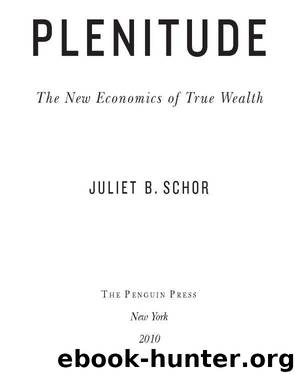Plenitude by Juliet B. Schor

Author:Juliet B. Schor
Language: eng
Format: epub
Publisher: Penguin USA, Inc.
Published: 2010-05-03T04:00:00+00:00
Chapter Five
THE ECONOMICS OF PLENITUDE
Policies that encourage business-as-usual growth have begun to jeopardize planetary survival. It’s increasingly apparent that we need to negotiate the transition from the gray (or dirty) economy to a green alternative.
Concretely, this means building a well-designed and expanding clean sector, with the right mechanisms and incentives in place to move people and resources into it. We can’t just assume that what worked in the industrial economy is efficient in the green one, because it isn’t. But if we manage it right, the plenitude shift will offer not just a richer, more satisfying way of life for the individuals who practice it, but significant new and widespread wealth. It’s designed for efficiency, innovation, and fairness.
The plenitude principles of the previous chapter are the building blocks that speed the transition and produce the conditions for a vibrant sustainability. On the production side, these are falling hours of BAU work, an expanding army of self-provisioners and small businesses, and the reinvigoration of social capital.
Hours reductions serve multiple purposes. As hours fall in the gray sector, labor will flow into the green one. Shorter hours in both sectors also raise hourly productivity and provide livelihoods, by expanding the number of jobs. Throughout the history of capitalism, displaced workers have been absorbed in part through reductions in working hours.
The second component is the spur to self-provisioning and small businesses. This scale of enterprise, networked locally, regionally, and globally, looks more and more like the efficient model of the future. Plenitude gives individuals time to acquire skills and become entrepreneurial. It’s a path with low capital requirements, which makes it available to large numbers of people. It also builds social capital, which is necessary for successful networks and local economies. On the consumption side, consumers’ demand for low-impact goods and services creates the market for these enterprises.
Investment in social capital and strong economic ties among people make up the third principle, and they make possible the successful management of ecological commons through collective efforts and shared ownership. Regeneration and enhancement of ecosystems creates wealth that can be widely held and enjoyed. And of course sustainability will also require conventional solutions, such as a significant price for carbon and environmentally sound accounting.
But I begin with a dimension of the transition that has largely been ignored in discussions about sustainability: the role of knowledge and its peculiar economics. Accelerating the transition to clean production will require new ways to disseminate ecological know-how. Without getting that piece right, we’ll be missing a major source of wealth and an opportunity to restore the planet.
Download
This site does not store any files on its server. We only index and link to content provided by other sites. Please contact the content providers to delete copyright contents if any and email us, we'll remove relevant links or contents immediately.
International Integration of the Brazilian Economy by Elias C. Grivoyannis(111059)
The Radium Girls by Kate Moore(12028)
Turbulence by E. J. Noyes(8049)
Nudge - Improving Decisions about Health, Wealth, and Happiness by Thaler Sunstein(7707)
The Black Swan by Nassim Nicholas Taleb(7129)
Rich Dad Poor Dad by Robert T. Kiyosaki(6632)
Pioneering Portfolio Management by David F. Swensen(6300)
Man-made Catastrophes and Risk Information Concealment by Dmitry Chernov & Didier Sornette(6019)
Zero to One by Peter Thiel(5802)
Secrecy World by Jake Bernstein(4753)
Millionaire: The Philanderer, Gambler, and Duelist Who Invented Modern Finance by Janet Gleeson(4478)
The Age of Surveillance Capitalism by Shoshana Zuboff(4292)
Skin in the Game by Nassim Nicholas Taleb(4248)
The Money Culture by Michael Lewis(4207)
Bullshit Jobs by David Graeber(4190)
Skin in the Game: Hidden Asymmetries in Daily Life by Nassim Nicholas Taleb(4007)
The Dhandho Investor by Mohnish Pabrai(3765)
The Wisdom of Finance by Mihir Desai(3747)
Blockchain Basics by Daniel Drescher(3583)
